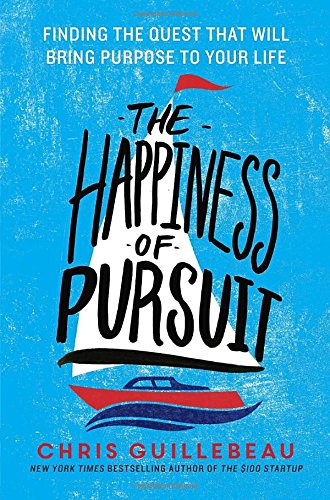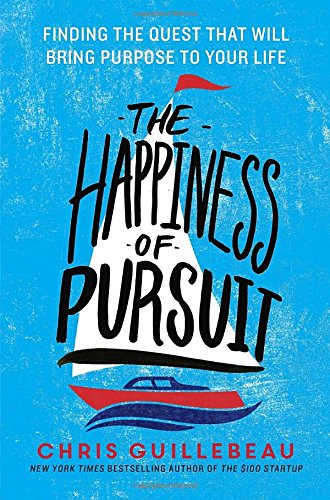
A remarkable book that will both guide and inspire, The Happiness of Pursuit reveals how anyone can bring meaning into their life by undertaking a quest.
When he set out to visit all of the planet’s countries by age thirty-five, compulsive goal seeker Chris Guillebeau never imagined that his journey’s biggest revelation would be how many people like himself exist – each pursuing a challenging quest. And, interestingly, these quests aren’t just travel-oriented. On the contrary, they’re as diverse as humanity itself. Some involve exploration; others the pursuit of athletic or artistic excellence; still others a battle against injustice or poverty or threats to the environment.
Everywhere that Chris visited he found ordinary people working toward extraordinary goals, making daily down payments on their dream. These “questers” included a suburban mom pursuing a wildly ambitious culinary project, a DJ producing the world’s largest symphony, a young widower completing the tasks his wife would never accomplish, and a teenager crossing an entire ocean alone – as well as a do-it-yourselfer tackling M.I.T.’s computer-science course, a nerd turning himself into real-life James Bond, and scores of others writing themselves into the record books.
The more Chris spoke with these strivers, the more he began to appreciate the direct link between questing and long-term happiness — how going after something in a methodical way enriches our lives — and he was compelled to complete a comprehensive study of the phenomenon and extract the best advice. In The Happiness of Pursuit he draws on interviews with hundreds of questers, revealing their secret motivations, their selection criteria, the role played by friends and family, their tricks for solving logistics, and the importance of documentation.
Equally fascinating is Chris’ examination of questing’s other side, including questers’ acute awareness of mortality, their struggle against monotony, and their wistful feelings once a quest has succeeded. What happens after the summit is climbed, the painting hung, the endurance record broken, the “at risk” community saved?
A book that challenges each of us to take control – to make our lives be about something while at the same time remaining clear-eyed about the commitment — The Happiness of Pursuit will inspire readers of every age and aspiration. It’s a playbook for making your life count.
A Q&A with Author Chris Guillebeau
What do you mean in your book by questing?
Questing refers to the pursuit of a long-term challenge or adventure with a series of intermediate steps. The “questers” I write about are focused on a specific goal, often to the exclusion of all others. They devote years toward the journey, inevitably finding themselves changed along the way.
What is a quest? Is it just a long trip or athletic pursuit?
A quest has a few specific characteristics: a clear goal, a real challenge, and a set of milestones along the way. Interestingly, while a quest is often an extended physical journey—like visiting every country in the world or circumnavigating the oceans in a small sailboat—there are many other kinds of quests as well. Over several years of research, I met activists, academics, artists, and others who chose to spend long amounts of time on something that mattered to them. I was interested in why they undertook such a mission, and what happened to them as they drew closer to their goal.
How long did it take to visit every country in the world?
Start to finish, it took eleven years. However, I didn’t really begin the quest aspect of traveling until after I’d been to the first forty or fifty countries. From there, I set a goal of visiting one-hundred countries. As I approached the first one-hundred, I decided to attempt the challenging of visiting all of them. This led to a five-year process of traveling 300,000+ miles a year, constantly learning about the world and figuring out logistics as I went along. I also visited many of the same countries over and over as I traveled to locations further afield.
How do questers decide on what to pursue and what to avoid?
If you’re going to pursue a quest, you should choose something you’re really excited about. My quest was to visit every country in the world, mostly because I loved travel and enjoyed combining it with the structure of goal-setting. Others focus on their own hobbies or passions, turning them into the long-term pursuits: to knit 10,000 hats, to walk across America, to become a real-life ninja, and so on.
It also helps if there’s a deeper purpose to your quest. Many of the people I talked to for the book felt a sense of calling or mission, even if they weren’t religious. They were compelled; they simply had to pursue the quest. They knew if they didn’t, they would always regret it.
What role do family and friends play in questers pursuing their dreams?
A complicated one. In many cases, family and friends provided critical support for the questers. In some cases, though, family and friends “just didn’t understand.” In these cases it was usually important for the quester to establish an outside support group as they progressed along their way.
Is it important to document a quest?
One of the key themes of quests is that they must be measurable. They must have an end goal—you have to be able to say, “This is what I’m working toward and I’ll complete it when x happens.” Documenting the steps along the way provides tremendous momentum, since you can see how far they’ve come and how far still remains.
In my case I used a Wikipedia article that contained a list of every country. I copied it into Evernote and whenever I visited a new country, I’d place a big X beside it. As the years went by, the number of Xs grew until there were only a few places I hadn’t visited. Finally, I was able to visit those places as well. Just having that file gave me a sense of urgency as I made my plans and set out on another Round-the-World trip or 30-hour series of flights.
What happens to someone after they’ve completed the quest or achieved their goal?
Most of the time there’s a feeling of accomplishment combined with a sense of melancholy or even alienation. Quests are complicated! Very often, much of the identity of the quester lies in the quest itself. The best path forward is usually to take some time to reflect on the journey. Then—whenever the time is right—you’ll need a new quest.

